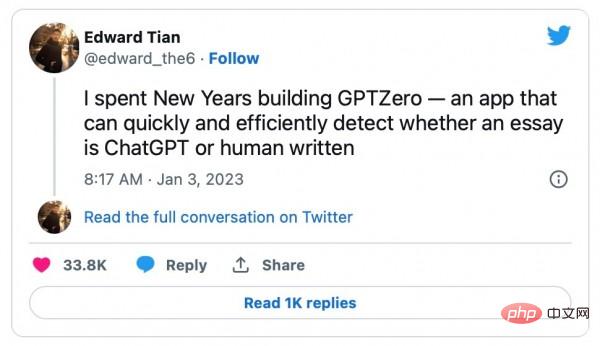 Technology peripherals
Technology peripherals
 AI
AI
 Has ChatGPT become a cheating tool? How should schools and teachers view AI writing?
Has ChatGPT become a cheating tool? How should schools and teachers view AI writing?
Has ChatGPT become a cheating tool? How should schools and teachers view AI writing?
As OpenAI’s ChatGPT was officially made public in December last year, the resulting cheating problem has attracted widespread attention in the academic community. Teaching and school boards across the country are beginning to seriously consider whether they should open their arms to AI writing tools or severely curb them.
Teachers are actually worried and excited because chatbots such as ChatGPT can indeed generate articles in almost any format and on any topic. It can easily compose a Shakespearean sonnet-style but witty piece of writing, or write a 500-word essay on the symbolic meaning of blue curtains in The Great Gatsby. You can even use tools like Quillbot to explain articles generated by ChapGPT, just like a caring "gunman" explaining your creative ideas to users.
Of course, no one imagines that ChatGPT can write speaker-level copywriting. But one comment put it well, "Everything ChatGPT knows is dangerous enough."
In addition to the narrow topic of student papers, there are also some teachers who are excited about the potential of AI writing to enhance the learning experience. , other teachers are unsure about introducing such tools into their classrooms. At present, the attitudes towards ChatGPT in various parts of the United States and on the Internet can be said to be complex and diverse.

New York City prohibits students from using ChatGPT bots in schools
The New York City Department of Education explicitly prohibits students and teachers from using ChatGPT on Academy networks and devices. It seems that It is also the first policy to oppose the use of AI robots in schools. According to the Washington Post, it's unclear whether students can use ChatGPT off campus.
In a statement to The Washington Post, New York City Department of Education spokesperson Jenna Lyle said, “While this tool promises to provide quick, easy answers to questions, it may prevent students from Develop critical thinking and problem-solving skills, which are critical for academics and throughout life."
Compared with New York, which is moving very quickly, other states and school districts are still struggling with this formulation What kind of countermeasures. However, in some schools, teachers themselves have implemented preventive measures in their classes before official opinions from the school district are released.
Teachers at Pacifica Oceana High School in California have issued a warning to students not to use AI writing software to complete assignments. Some teachers said in interviews that they may require students to hand in "handwritten assignments that cannot be copied/pasted directly from AI."
In order to prevent the use of AI to cheat, some websites have also created tools to identify AI writing, including writer.com’s AI content detector and the anti-ChatGPT tool GPTZero.

"I spent the New Year holidays building GPTZero - an app that quickly detects whether an article was human-written or generated by ChatGPT."
It is worth mentioning that OpenAI itself has stated that it is working on a method of digitally adding a "watermark" to the output text, which means that the text will retain AI-generated information that can be discovered by robots but cannot be recognized by humans. clue.
Embracing the Potential
On the Internet, especially on TikTok, ChatGPT has also triggered heated debates among teachers. Some educators believe chatbots can help teachers create lesson plans and materials to streamline assignment completion. Dan Lewer wrote in the comments, "Please note that my point is that AI can help teachers do their jobs better, not completely do their jobs for them. Robots cannot replace good teachers."
TikTok Another teacher, Tyler Tarver, believes that ChatGPT “can help teachers better attract and support students and prepare teaching materials for children of different levels.” To prove his assertion, Tarver used AI to create part of the courseware script. Tarver also mentioned, “Children can directly submit assignments that interest them, such as writing a 500-word article on Harry Potter and the Deathly Hallows.” In addition to his recognition of ChatGPT itself, he also pays attention to chatbots The potential of this format as a classroom tool. In his opinion, chatbots can help teachers generate teaching materials and can also be used as an auxiliary discussion tool for students.
Of course, these debates did not lead to consensus - in the end, some teachers were still optimistic, while others were still hesitant. Judging from the trend of public opinion on TikTok, teachers who support it mainly regard ChatGPT as a pure tool similar to calculators and mobile phones - it can be used to help students complete their homework, but cannot directly complete their homework for them.
So at least for now, whether AI writing tools can be used in the classroom is still determined by the needs of individual teachers and students.
The above is the detailed content of Has ChatGPT become a cheating tool? How should schools and teachers view AI writing?. For more information, please follow other related articles on the PHP Chinese website!

Hot AI Tools

Undresser.AI Undress
AI-powered app for creating realistic nude photos

AI Clothes Remover
Online AI tool for removing clothes from photos.

Undress AI Tool
Undress images for free

Clothoff.io
AI clothes remover

AI Hentai Generator
Generate AI Hentai for free.

Hot Article

Hot Tools

Notepad++7.3.1
Easy-to-use and free code editor

SublimeText3 Chinese version
Chinese version, very easy to use

Zend Studio 13.0.1
Powerful PHP integrated development environment

Dreamweaver CS6
Visual web development tools

SublimeText3 Mac version
God-level code editing software (SublimeText3)

Hot Topics
 1377
1377
 52
52
 How to add a new column in SQL
Apr 09, 2025 pm 02:09 PM
How to add a new column in SQL
Apr 09, 2025 pm 02:09 PM
Add new columns to an existing table in SQL by using the ALTER TABLE statement. The specific steps include: determining the table name and column information, writing ALTER TABLE statements, and executing statements. For example, add an email column to the Customers table (VARCHAR(50)): ALTER TABLE Customers ADD email VARCHAR(50);
 What is the syntax for adding columns in SQL
Apr 09, 2025 pm 02:51 PM
What is the syntax for adding columns in SQL
Apr 09, 2025 pm 02:51 PM
The syntax for adding columns in SQL is ALTER TABLE table_name ADD column_name data_type [NOT NULL] [DEFAULT default_value]; where table_name is the table name, column_name is the new column name, data_type is the data type, NOT NULL specifies whether null values are allowed, and DEFAULT default_value specifies the default value.
 SQL Clear Table: Performance Optimization Tips
Apr 09, 2025 pm 02:54 PM
SQL Clear Table: Performance Optimization Tips
Apr 09, 2025 pm 02:54 PM
Tips to improve SQL table clearing performance: Use TRUNCATE TABLE instead of DELETE, free up space and reset the identity column. Disable foreign key constraints to prevent cascading deletion. Use transaction encapsulation operations to ensure data consistency. Batch delete big data and limit the number of rows through LIMIT. Rebuild the index after clearing to improve query efficiency.
 How to set default values when adding columns in SQL
Apr 09, 2025 pm 02:45 PM
How to set default values when adding columns in SQL
Apr 09, 2025 pm 02:45 PM
Set the default value for newly added columns, use the ALTER TABLE statement: Specify adding columns and set the default value: ALTER TABLE table_name ADD column_name data_type DEFAULT default_value; use the CONSTRAINT clause to specify the default value: ALTER TABLE table_name ADD COLUMN column_name data_type CONSTRAINT default_constraint DEFAULT default_value;
 Use DELETE statement to clear SQL tables
Apr 09, 2025 pm 03:00 PM
Use DELETE statement to clear SQL tables
Apr 09, 2025 pm 03:00 PM
Yes, the DELETE statement can be used to clear a SQL table, the steps are as follows: Use the DELETE statement: DELETE FROM table_name; Replace table_name with the name of the table to be cleared.
 How to deal with Redis memory fragmentation?
Apr 10, 2025 pm 02:24 PM
How to deal with Redis memory fragmentation?
Apr 10, 2025 pm 02:24 PM
Redis memory fragmentation refers to the existence of small free areas in the allocated memory that cannot be reassigned. Coping strategies include: Restart Redis: completely clear the memory, but interrupt service. Optimize data structures: Use a structure that is more suitable for Redis to reduce the number of memory allocations and releases. Adjust configuration parameters: Use the policy to eliminate the least recently used key-value pairs. Use persistence mechanism: Back up data regularly and restart Redis to clean up fragments. Monitor memory usage: Discover problems in a timely manner and take measures.
 phpmyadmin creates data table
Apr 10, 2025 pm 11:00 PM
phpmyadmin creates data table
Apr 10, 2025 pm 11:00 PM
To create a data table using phpMyAdmin, the following steps are essential: Connect to the database and click the New tab. Name the table and select the storage engine (InnoDB recommended). Add column details by clicking the Add Column button, including column name, data type, whether to allow null values, and other properties. Select one or more columns as primary keys. Click the Save button to create tables and columns.
 Monitor Redis Droplet with Redis Exporter Service
Apr 10, 2025 pm 01:36 PM
Monitor Redis Droplet with Redis Exporter Service
Apr 10, 2025 pm 01:36 PM
Effective monitoring of Redis databases is critical to maintaining optimal performance, identifying potential bottlenecks, and ensuring overall system reliability. Redis Exporter Service is a powerful utility designed to monitor Redis databases using Prometheus. This tutorial will guide you through the complete setup and configuration of Redis Exporter Service, ensuring you seamlessly build monitoring solutions. By studying this tutorial, you will achieve fully operational monitoring settings



